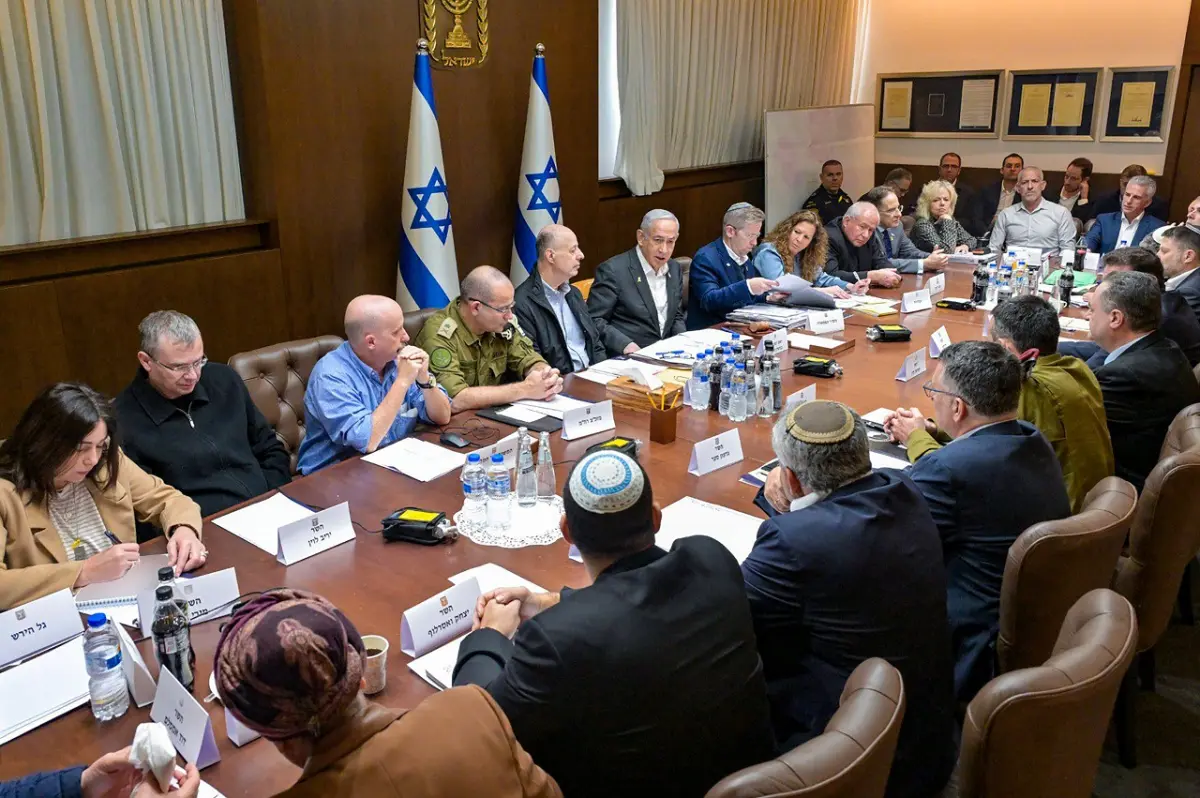
The Israeli security cabinet approved this Friday, January 17, a ceasefire agreement and release of hostages in Gazarecommending that the broader government give its final green light, Prime Minister Benjamin Netanyahu’s office said.
(Also read: Israel says first hostages will be freed on Sunday)
“After examining all political, security and humanitarian aspects, and understanding that the proposed agreement supports the achievement of the war objectives, the Ministerial Committee on National Security Affairs (Security Cabinet) recommended that the Government approve the proposed scheme,” Prime Minister Benjamin Netanyahu’s Office announced.
The Government of Israel is scheduled to meet in the afternoon to give the green light to the ceasefire agreed upon by the mediators with Hamas last Wednesday, as confirmed to EFE by an Israeli official under anonymity.
Israeli sources had previously said that the meeting was going to take place on Saturday night, after the Shabbatwhich had provoked the anger of the families of the hostageswho said the delay brought ratification of the agreement dangerously closer to Sunday, the day the first hostages are to be freed in an exchange for Palestinian prisoners.
As agreed, the Ceasefire takes effect Sunday at 12:15 at noon, and according to reports from the Israeli media Walla, the exchange of the first hostages will begin around 4:00 p.m. (2:00 p.m.), although at the moment there is no official announcement of the time.
While there are less than 48 hours left for this to happen, Israeli attacks continue in Gaza and since Qatar’s announcement of the truce last Wednesday, at least 113 Palestinians have died in Gaza, 87 of them in the bombed northern city of Gaza, and more than 260 have been injured, according to the latest figures from the Gazan Civil Defense.
(Read also: War between Israel and Hamas: figures of deaths and victims that the conflict has left until today)
What does the ceasefire in Gaza raise?
The agreement, which should put an end to 15 months of war, provides in one first phase of six weeks release 33 hostages in Gaza, in exchange for hundreds of Palestinian prisoners held in Israel.
The first releases will take place on Sunday, the Israeli government announced. The families of the hostages have already been informed and preparations are being finalized to receive them. According to two sources close to Hamas, the first group will be made up of three Israeli women.
In exchange, Israel agreed to “release a number of important prisoners,” one of the sources said.
According to French President Emmanuel Macron, two Franco-Israelis, Ofer Kalderon and Ohad Yahalomi, are on the list of the first 33 releasable captives. Both were kidnapped in the Nir Oz kibbutz, along with several of their children, who were released in a first truce, in November 2023.
“There are mixed feelings. On the one hand, joy, mixed with horrible stress before knowing if it is really going to happen,” Ifat Kalderon, Ofer Kalderon’s cousin, said Wednesday.
OMAR AL-QATTAA/AFP
The second phase includes the release of the rest of the hostages. The third and Last phase will focus on the reconstruction of the Palestinian territory and in the return of the bodies of the dead hostages.
During the first stage, the modalities of the second will be negotiated, that is, “the definitive end of the war”, according to the Prime Minister of Qatar, Mohamed ben Abdelrahman al Thani.
The ceasefire does not resolve the obstacle over the political future in the Gaza Strip, of 2.4 million inhabitants, governed since 2007 by a now very weak Hamas.
Israel opposes being administered from now on by Hamas or the Palestinian Authority, which governs the West Bank with limited powers, and the Palestinians reject any foreign interference.
(Also read: Petro talks about ceasefire agreement in Gaza: he is willing to “send medical teams”)
Palestinians hope to return home to Gaza
Before the start of the truce, displaced Palestinians prepare to return home. “I’m waiting for Sunday morning when they announce the ceasefire,” says Nasr al Gharabli, who fled Gaza City in the north for a refugee camp further south. “I’m going to kiss my land. I regret having left it. If I had died in my land, it would have been better than being displaced here,” he says.
The war, which has left Gaza with a level of destruction “unprecedented in recent history”, according to the UN, broke out on October 7, 2023 after the bloody attack by Hamas on Israeli soil.
Islamist commandos killed 1,210 people, mostly civilians, according to an AFP count based on official data. They also kidnapped 251 people, of whom 94 remain in Gaza. At least 34 of them have died, according to the Israeli army.
Israel launched a retaliatory campaign that has killed at least 46,876 people in the Gaza Strip, mostly civiliansaccording to data from the Ministry of Health of the Hamas government, which the UN considers reliable.
Source: https://www.noticiascaracol.com/mundo/gabinete-de-seguridad-israeli-aprueba-alto-el-fuego-en-gaza-y-pide-a-gobierno-ratificarlo-cb20


